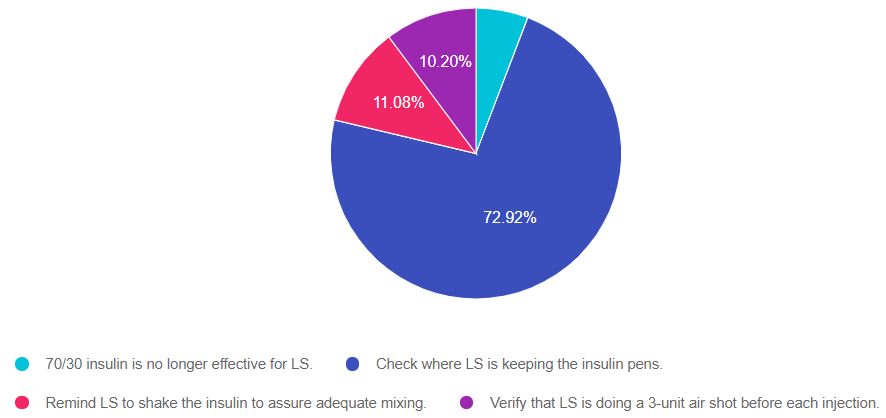
This question addressed rising blood glucose and best insulin adjustment strategy. Since this was our most popular question this month, we wanted to provide an explanation to pass on this valuable information to all of you and people living with diabetes.
Before we start though, if you don’t want any spoilers and haven’t tried the question yet, you can answer below: Answer Question
Question: LS takes 20 units 70/30 insulin twice daily with an insulin pen. LS states that blood sugars are usually on target, but over the past week, blood sugars have suddenly increased. LS confirms that they are taking insulin on a regular basis.
Which factor could be contributing to this sudden blood glucose rise?
Answer Choices:
- 70/30 insulin is no longer effective for LS.
- Check where LS is keeping the insulin pens.
- Remind LS to shake the insulin to assure adequate mixing.
- Verify that LS is doing a 3-unit air shot before each injection.

As shown above, the most common choice was option 2, the second most common answer was option 3, then option 4, and finally option 1.
Watch out for “Juicy Answers”
If you are thinking about taking a certification exam, this practice test question will set you up for success. The test writers will anticipate possible wrong answers based on the details in the question. They will wave those “juicy answers” right under your nose. Your job is to weed through the particulars, pluck out the most important elements, eliminate at least two false answers to improve your odds of success to 50/50.
Answer 1 is incorrect “70/30 insulin is no longer effective for LS”. About 5% chose this answer. Based on the vignette, LS has been using 70/30 insulin and keeping blood glucose in target. It is only in the last week that blood glucose levels are rising. This points to another undiscovered recent issue that is causing blood sugars to elevate.
Answer 2 is correct! “Check where LS is keeping the insulin pens”. A whopping 73% of you chose this correct answer Great job. Insulin is a very sensitive protein and can lose effectiveness when stored in places where there are extreme temperatures.
Read package insert for detailed information:
- Keep at room temperature below 77°F – 86°F (depending on the manufacturer). Do not freeze our use previously frozen insulin
- Keep vials in box and away from direct heat or light.
- Unopened vials can be used until the expiration date if stored in a refrigerator.
Answer 3 is incorrect. “Remind LS to shake the insulin to assure adequate mixing.” About 11% of respondents chose this. Insulin manufacturers recommend NOT shaking 70/30 insulin since it can make the insulin less effective.
70/30 insulin mixing instructions
Invert the vial or pen at least 10 times to mix the two insulin until is appears white and cloudy. Do not shake. Do not use it if insulin looks clear or contains any lumps or particles.
Finally, Answer 4 is incorrect. “Verify that LS is doing a 3-unit air shot before each injection.” 10% chose this answer. The correct answer is to prime the insulin pen with 2 units of insulin before each injection to make sure that the pen and needle are working. When priming the pen, at least one drop of insulin should appear at the tip of the needle. Also, it’s a good idea to remind people to change the needle before each injection.
We hope you appreciate this week’s rationale! Thank you so much for taking the time to answer our Question of the Week and participate in this fun learning activity!
Want more practice questions?
Try our Test Taking Toolkit!
$49 | 220+ Questions
In this course, Coach Beverly details the content of the exam and test-taking tips. Plus, she reviews a sampling of the questions and explains how to dissect the question, eliminate the wrong answers and avoid getting lured in by juicy answers.
Sign up for Diabetes Blog Bytes – we post one daily Blog Byte from Monday to Friday. And of course, Tuesday is our Question of the Week. It’s Informative and FREE! Sign up below!
[yikes-mailchimp form=”1″]Accreditation: Diabetes Education Services is an approved provider by the California Board of Registered Nursing, Provider 12640, and Commission on Dietetic Registration (CDR), Provider DI002. Since these programs are approved by the CDR it satisfies the CE requirements for the CDCES regardless of your profession.*
The use of DES products does not guarantee the successful passage of the CDCES exam. CBDCE does not endorse any preparatory or review materials for the CDCES exam, except for those published by CBDCE.









